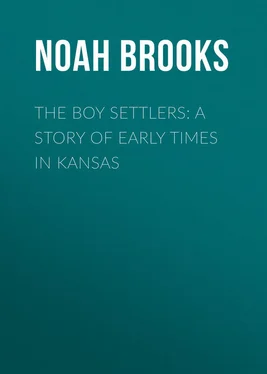Noah Brooks - The Boy Settlers - A Story of Early Times in Kansas
Здесь есть возможность читать онлайн «Noah Brooks - The Boy Settlers - A Story of Early Times in Kansas» — ознакомительный отрывок электронной книги совершенно бесплатно, а после прочтения отрывка купить полную версию. В некоторых случаях можно слушать аудио, скачать через торрент в формате fb2 и присутствует краткое содержание. Жанр: foreign_antique, foreign_prose, foreign_children, на английском языке. Описание произведения, (предисловие) а так же отзывы посетителей доступны на портале библиотеки ЛибКат.
- Название:The Boy Settlers: A Story of Early Times in Kansas
- Автор:
- Жанр:
- Год:неизвестен
- ISBN:нет данных
- Рейтинг книги:5 / 5. Голосов: 1
-
Избранное:Добавить в избранное
- Отзывы:
-
Ваша оценка:
- 100
- 1
- 2
- 3
- 4
- 5
The Boy Settlers: A Story of Early Times in Kansas: краткое содержание, описание и аннотация
Предлагаем к чтению аннотацию, описание, краткое содержание или предисловие (зависит от того, что написал сам автор книги «The Boy Settlers: A Story of Early Times in Kansas»). Если вы не нашли необходимую информацию о книге — напишите в комментариях, мы постараемся отыскать её.
The Boy Settlers: A Story of Early Times in Kansas — читать онлайн ознакомительный отрывок
Ниже представлен текст книги, разбитый по страницам. Система сохранения места последней прочитанной страницы, позволяет с удобством читать онлайн бесплатно книгу «The Boy Settlers: A Story of Early Times in Kansas», без необходимости каждый раз заново искать на чём Вы остановились. Поставьте закладку, и сможете в любой момент перейти на страницу, на которой закончили чтение.
Интервал:
Закладка:
The two leaders of this little flock had been asking about the prospects for taking up claims along the Kansas River, or the Kaw, as that stream was then generally called. To their great dismay, they had found that there was very little vacant land to be had anywhere near the river. They would have to push on still further westward if they wished to find good land ready for the pre-emptor. Rumors of fighting and violence came from the new city of Lawrence, the chief settlement of the free-State men, on the Kaw; and at Grasshopper Falls, still further to the west, the most desirable land was already taken up, and there were wild stories of a raid on that locality being planned by bands of Border Ruffians. They were in a state of doubt and uncertainty.
“There she is! There she is!” said Charlie, in a loud whisper, looking in the direction of a tall, unpainted building that stood among the trees that embowered the little settlement. Every one looked and saw a young lady tripping along through the hazel brush that still covered the ground. She was rather stylishly dressed, “citified,” Oscar said; she swung a beaded work-bag as she walked.
“Who is it? Who is it?” asked Oscar, breathlessly. She was the first well-dressed young lady he had seen since leaving Iowa.
“Sh-h-h-h!” whispered Charlie. “That’s Quindaro. A young fellow pointed her out to me last night, just after we drove into the settlement. She lives with her folks in that tall, thin house up there. I have been looking for her to come out. See, she’s just going into the post-office now.”
“Quindaro!” exclaimed Sandy. “Why, I thought Quindaro was a squaw.”
“She’s a full-blooded Delaware Indian girl, that’s what she is, and she was educated somewhere East in the States; and this town is named for her. She owns all the land around here, and is the belle of the place.”
“She’s got on hoop-skirts, too,” said Oscar. “Just think of an Indian girl–a squaw–wearing hoops, will you?” For all this happened, my young reader must remember, when women’s fashions were very different from what they now are. Quindaro–that is to say, the young Indian lady of that time–was dressed in the height of fashion, but not in any way obtrusively. Charlie, following with his eyes the young girl’s figure, as she came out of the post-office and went across the ravine that divided the settlement into two equal parts, mirthfully said, “And only think! That is a full-blooded Delaware Indian girl!”
But, their curiosity satisfied, the boys were evidently disappointed with their first view of Indian civilization. There were no blanketed Indians loafing around in the sun and sleeping under the shelter of the underbrush, as they had been taught to expect to see them. Outside of the settlement, men were ploughing and planting, breaking prairie, and building cabins; and while our party were looking about them, a party of Delawares drove into town with several ox-carts to carry away the purchases that one of their number had already made. It was bewildering to boys who had been brought up on stories of Black Hawk, the Prophet, and the Sacs and Foxes of Illinois and Wisconsin. A Delaware Indian, clad in the ordinary garb of a Western farmer and driving a yoke of oxen, and employing the same curious lingo used by the white farmers, was not a picturesque object.
“I allow that sixty dollars is a big price to pay for a yoke of cattle,” said Mr. Howell, anxiously. He was greatly concerned about the new purchase that must be made here, according to the latest information. “We might have got them for two-thirds of that money back in Illinois. And you know that Iowa chap only reckoned the price of these at forty-five, when we traded with him at Jonesville.”
“It’s no use worrying about that now, Aleck,” said his brother-in-law. “I know you thought then that we should need four yoke for breaking the prairie; but, then, you weren’t certain about it, and none of the rest of us ever had any sod-ploughing to do.”
“No, none of us,” said Sandy, with delightful gravity; at which everybody smiled. One would have thought that Sandy was a veteran in everything but farming.
“I met a man this morning, while I was prowling around the settlement,” said Charlie, “who said that there was plenty of vacant land, of first-rate quality, up around Manhattan. Where’s that, father–do you know? He didn’t, but some other man, one of the New England Society fellows, told him so.”
But nobody knew where Manhattan was. This was the first time they had ever heard of the place. The cattle question was first to be disposed of, however, and as soon as the party had finished their breakfast, the two men and Charlie sallied out through the settlement to look up a bargain. Oscar and Sandy were left in the camp to wash the dishes and “clean up,” a duty which both of them despised with a hearty hatred.
“If there’s anything I just fairly abominate, it’s washing dishes,” said Sandy, seating himself on the wagon-tongue and discontentedly eyeing a huge tin pan filled with tin plates and cups, steaming in the hot water that Oscar had poured over them from the camp-kettle.
“Well, that’s part of the play,” answered Oscar, pleasantly. “It isn’t boy’s work, let alone man’s work, to be cooking and washing dishes. I wonder what mother would think to see us at it?” And a suspicious moisture gathered in the lad’s eyes, as a vision of his mother’s tidy kitchen in far-off Illinois rose before his mind. Sandy looked very solemn.
“But, as daddy says, it’s no use worrying about things you can’t help,” continued the cheerful Oscar; “so here goes, Sandy. You wash, and I’ll dry ’em.” And the two boys went on with their disagreeable work so heartily that they soon had it out of the way; Sandy remarking as they finished it, that, for his part, he did not like the business at all, but he did not think it fair that they two, who could not do the heavy work, should grumble over that they could do. “The worst of it is,” he added, “we’ve got to look forward to months and months of this sort of thing. Father and Uncle Charlie say that we cannot have the rest of the family come out until we have a house to put them in–a log-cabin, they mean, of course; and Uncle Charlie says that we may not get them out until another spring. I don’t believe he will be willing for them to come out until he knows whether the Territory is to be slave or free. Do you, Oscar?”
“No, indeed,” said Oscar. “Between you and me, Sandy, I don’t want to go back to Illinois again, for anything; but I guess father will make up his mind about staying only when we find out if there is to be a free-State government or not. Dear me, why can’t the Missourians keep out of here and let us alone?”
“It’s a free country,” answered Sandy, sententiously. “That’s what Uncle Charlie is always saying. The Missourians have just as good a right here as we have.”
“But they have no right to be bringing in their slavery with ’em,” replied the other. “That wouldn’t be a free country, would it, with one man owning another man? Not much.”
“That’s beyond me, Oscar. I suppose it’s a free country only for the white man to come to. But I haven’t any politics in me. Hullo! there comes the rest of us driving a yoke of oxen. Well, on my word, they have been quick about it. Uncle Charlie is a master hand at hurrying things, I will say,” added Sandy, admiringly. “He’s done all the trading, I’ll be bound!”
“Fifty-five dollars,” replied Bryant, to the boys’ eager inquiry as to the price paid for the yoke of oxen. “Fifty-five dollars, and not so very dear, after all, considering that there are more people who want to buy than there are who want to sell.”
Читать дальшеИнтервал:
Закладка:
Похожие книги на «The Boy Settlers: A Story of Early Times in Kansas»
Представляем Вашему вниманию похожие книги на «The Boy Settlers: A Story of Early Times in Kansas» списком для выбора. Мы отобрали схожую по названию и смыслу литературу в надежде предоставить читателям больше вариантов отыскать новые, интересные, ещё непрочитанные произведения.
Обсуждение, отзывы о книге «The Boy Settlers: A Story of Early Times in Kansas» и просто собственные мнения читателей. Оставьте ваши комментарии, напишите, что Вы думаете о произведении, его смысле или главных героях. Укажите что конкретно понравилось, а что нет, и почему Вы так считаете.












